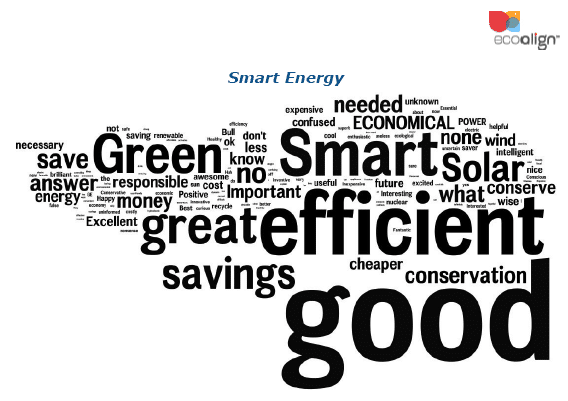“Green Gap Redux: Green Words Gone Wrong” EcoPinion Survey Points to Consumer Confusion and Value Gaps Connected to Conservation, Renewable Energy and Smart Grid
 A Ecopinion survey from EcoAlign reports that consumers are still confused by the words and terms used to describe, and the selling of, energy efficiency. The study found that consumers generally have positive associations with terms like “energy efficiency, “energy conservation” and “clean energy.” However, consumer understanding for terms like “demand response” and “peak pricing” have remained the same or decreased since 2007.
A Ecopinion survey from EcoAlign reports that consumers are still confused by the words and terms used to describe, and the selling of, energy efficiency. The study found that consumers generally have positive associations with terms like “energy efficiency, “energy conservation” and “clean energy.” However, consumer understanding for terms like “demand response” and “peak pricing” have remained the same or decreased since 2007.
- The Understanding Gap – It appears that increased media coverage of the tested terms has created favorable associations in consumer’s mind without increasing consumer understanding of the terms.
- The Language Gap – Although the terms tested favorably, the language used to articulate conservation and smart energy remain rooted in industry jargon based on regulatory, policy and operational modes of thinking. So although consumers favor the idea and intentions associated with energy conservation and smart energy, they do not understand the meaning of the terms themselves and have not “bought in” to them with their actions. There is clearly a need to bring a more educational and marketing focus to the conversation for greater awareness, understanding and engagement.
- The Commodity Gap – Two-thirds of Americans focused on either cost or value when considering the adoption of renewable energy. Chief marketing officers need to move from a commodity focus (cost) in their marketing to “value creation.”
- The Smart Grid Gap – Consumers believe the “smart grid” will provide environmental benefits, but little economic benefit for themselves. Given that almost two-thirds of Americans are “value buyers,” marketers need to make a compelling pitch for the individual financial savings in simple terms for the consumer.
“Compared to two years ago, consumers today have a greater understanding of the importance of conservation and clean energy but have not moved this awareness into action,” stated Andrea Fabbri, COO and Chief Marketing Officer. “The challenge for communications and marketing professionals is to make sustainability an economic value. This must start from engaging with consumers on a more deeply emotional level to transform beliefs into the values that shape consumer decisions. But it also has to be complemented by solutions that address the economic barriers.”
What does it all mean?
- There is a need to move from cognitive awareness to beliefs that drive decisions. Green marketers need to connect with their consumers emotionally, targeting value-based segments.
- Sustainability must become an economic value. To increase the relevance to consumers and speed of adoption, people need to more clearly see the economic value connected to sustainability, energy conservation and clean energy.
- More offerings need to be available. The market needs to provide more green products and sustainable offerings that make change possible, real and visible.
- Offerings must become more visible. We need to toss out cold “engineer speak,” and use emotional, consumer-friendly communication that inspires, creates urgency, and articulates a positive vision for energy efficiency and conservation.
- We need transitional offerings now. Timing is important and consumers need immediate niche solutions now, while more robust solutions that create greater green and economic value are developed for the masses. In short, we need action.
A copy of the full EcoPinion report is available here: Green Words Gone Wrong Report











at 11:41 am
Agreed. Completely. Coca-Cola is grounded in ingredients and the technology to make it. But Coke wouldn’t be around if that’s how they sold it. And neither would Nike. Remember the last Nike ad you saw that focused on the technology of their shoes? Probably not. And Mac? They don’t sell their technology, either. They all have one marketing approach in common – they sell the benefits of their technology. And the sustainable energy industry should consider doing the same. Companies are talking to themselves in techno-speak only they can understand. And when consumers hear it they tune out. Why? Consumers aren’t engineers. And they don’t want to be. Government officials aren’t engineers and they don’t want to be, either. They want benefits to they want to communicate those benefits to the folks who put them in office. At SolarChoice we’re doing what we think is the right way to market our passive solar heaters, describing them as passive solar heaters disguised as window blinds to our audience. We explain how they work with simple descriptions and supporting graphics. Are we doing everything right? No. No one does. But we’re doing our best to stay focused on the consumer and being relevant in their lives. We have to remember – no consumer cares about any product as much as the people who make and market it. We have to appeal to both the consumer’s head and heart with our messaging – because people do not make purchase decisions rationally – they make them based on emotion. Facts and figures might open the door – but they won’t close a sale.
at 7:59 pm
Thanks for the note, SolarChoice. All great points. For some reason, when it comes to the energy industry, or any resource conservation cause, engineers seem to rule the marketing. Have never figured that out. If you’re at a cocktail party, who tells the better joke: The engineer or the marketer?